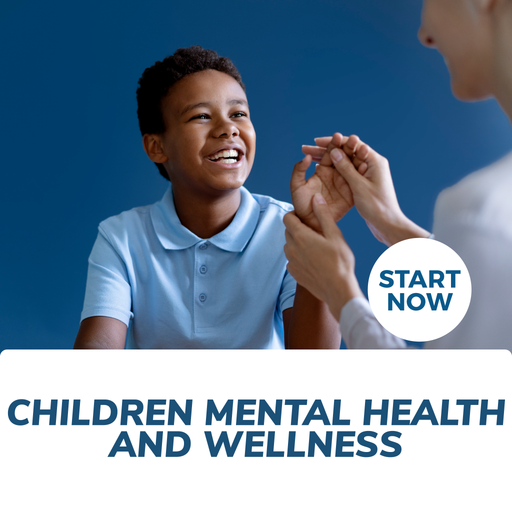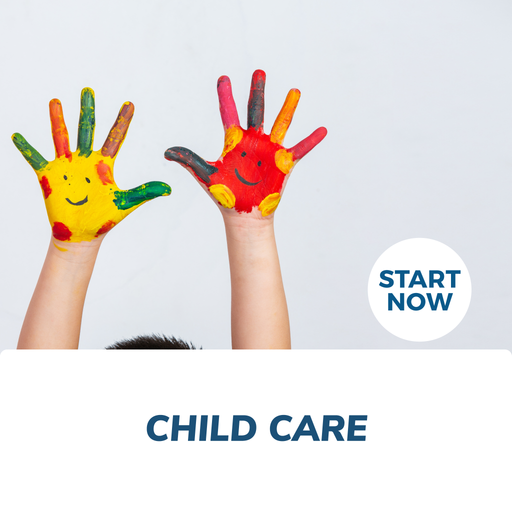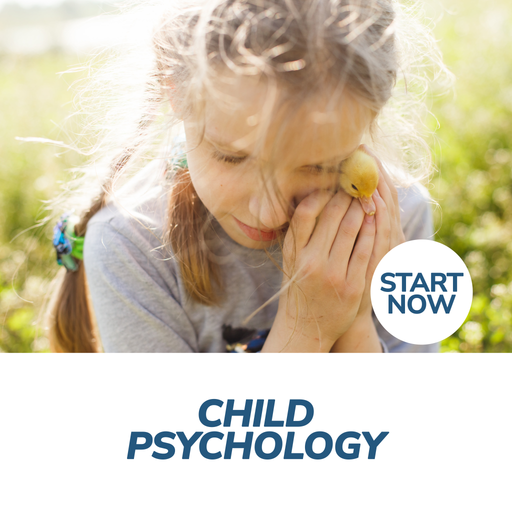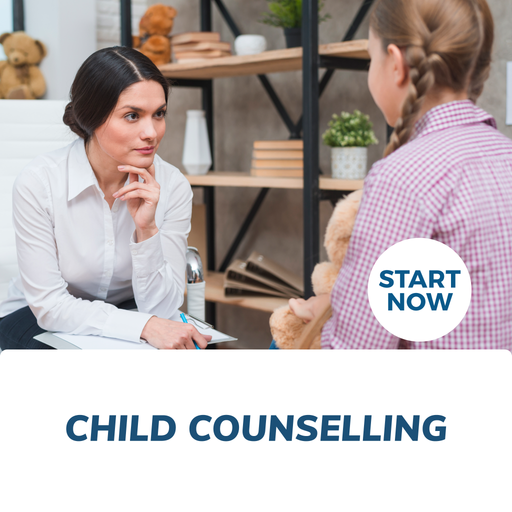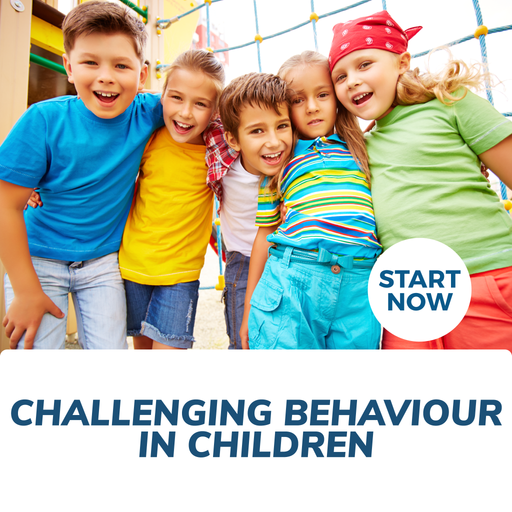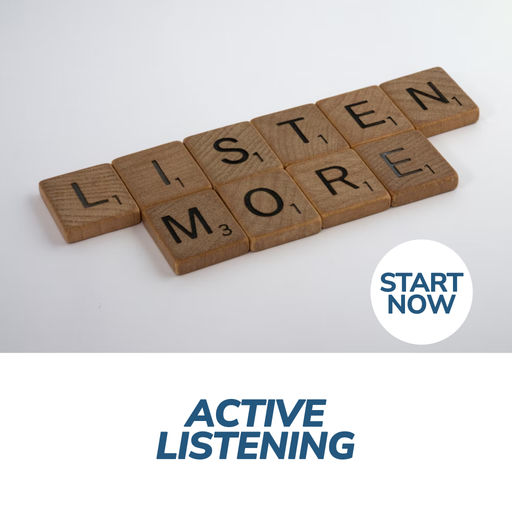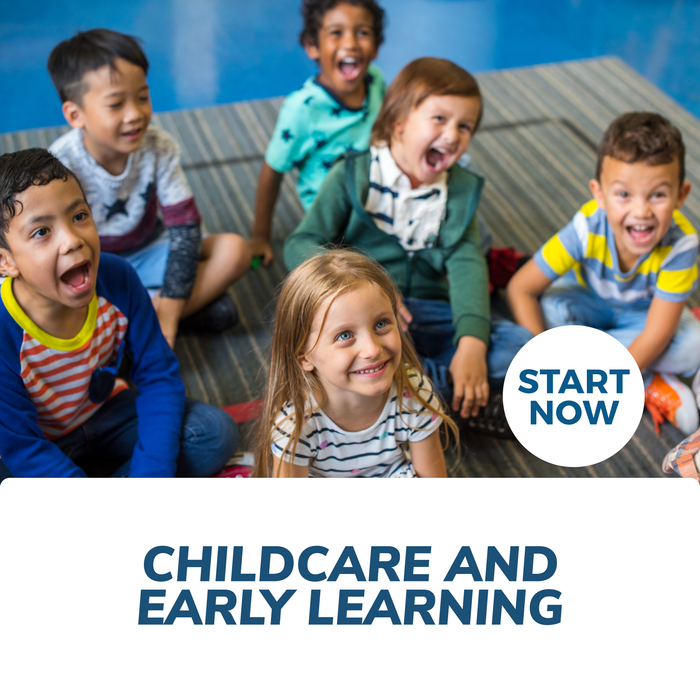
About This Course
What you will learn:
|
|
Study Childcare and Early Learning Online Course; Learn the Knowledge and Understanding that you Need to Work in Childcare
This course explains the benefits, importance, and value of Childcare and Early Learning. The socialization & developmental opportunities that it can provide to children are given focus, as are the difficulties faced by parents using day care.
Caring for someone else’s child is a big responsibility and so comes with many guidelines to follow. The Childcare and Early Learning Course explains Health & Safety directives, Care Plans, Individual Educational Programs (IEPs), Medical Needs, Safeguarding responsibilities and other associated issues.
You will learn how children develop physically from birth onwards and how this development affects learning. The course also explains the ways in which health, environment, and genetic factors can affect physical development.
Who would benefit from this course?
The Childcare and Early Learning Course will aid those considering a career in this area. Upon successful completion of this course, you will have gained an understanding of the roles of those working in Childcare, Education, and Play work, and acquired the knowledge needed to take the next step on your career path.
The information contained within the course is also beneficial to parents who wish to get a better understanding of how their children are being educated and how they may further aid their development at home.
Childcare and Early Learning Online Course - Requirements
The Childcare and Early Learning Online Course is delivered 100 percent online 24/7.
To successfully complete this course, a student must:
- Have access to the internet and the necessary technical skills to navigate the online learning resources
- Have access to any mobile device with internet connectivity (laptop, desktop, tablet)
- Be a self-directed learner
- Possess sound language and literacy skills
Quick Course Facts
- Course content is structured for easy comprehension
- Registered students gain unrestricted access to the Childcare and Early Learning Course
- All course material is available online 24/7 and can be accessed using any device
- Study online from anywhere in your own time at your own pace
- All students who complete the course will be awarded with a certificate of completion
For any additional questions please see our comprehensive FAQS tab above.
Childcare and Early Learning Online Diploma
Module 1: The Importance of Childcare and Early Learning
Part 1: The Value of Childcare
Learning Objectives:
- Highlight the need for quality and value of childcare provision in society and the childcare laws that apply to the facilities and people that work in childcare.
- Understand the different care and education provision that is available for young children as well as the need for some form of assessment of their abilities.
- Focus on the social and developmental needs of the young child, and be aware of the learning potential of both structured and unstructured activities.
- Show regard to parents, child and any other professionals that are working with the child. Illustrate an understanding of the differing needs of children
This module focuses on the value of quality Childcare & Early Learning provision and the benefits that it provides. It emphasizes the importance of nursery and early learning provision, as well as how children can benefit from the socialization and growth opportunities it can offer.
Topics to be discussed include:
- The Value of Childcare
- The Need for Childcare
- Childcare Provision
- Laws governing Childcare
- How Childcare is managed
Part 2: Early Learning Provision
The Emergence of Early Learning Provision
There have been many developments in educational theories and practice over the years. Early learning and early interactions are critical to the child's later growth, according to one of the major facets of educational philosophy that remains consistent. As a result, it is critical to pay particular attention to the consistency of childcare and early learning.
Topics to be discussed include:
- Nursery V Nursery School
- Early Years Curriculum
- Assessment
Part 3: Socialization and Developmental Opportunities
Family and Social Needs
Most children adjust well to their family unit and with the individuals they interact with on a daily basis. However, for a child who has spent their first few years of life surrounded only by their immediate relatives and has had no knowledge with the world outside of their home, socialization with a group of other children can be an overwhelming experience.
Topics to be discussed include:
- Developmental Opportunities
- Evidence to support Early Years provision
- Structured Activities V Unstructured Activities
Part 4: Respecting and Valuing the Child
The Cost of Childcare
This segment is not about the actual cost of childcare; rather, it is about the emotional costs. Essentially, this is for unquantifiable expenses. This form of expense may have both positive and negative consequences, which are sometimes ignored.
Topics to be discussed include:
- Whose responsibility?
- What if a child is not coping?
Module 2: Health &Safety and Other Legal Issues
Part 1: Health & Safety
Learning Objectives:
- Understand the need for Health & Safety directives and how these directives impact on childcare as well as need to report accidents and other concerns
- Show the need to access to additional information on the child in your care and the benefit of the input of a childcare professional during care plan reviews.
- Highlight the need for an IEP and the impact that it has on the educational provision and subsequent development of the child
- Focus on the importance of staff training in safeguarding issues and to show an awareness of signs of abuse, and the processes of investigation.
The aim of this module is to emphasize the significance of Health & Safety directives and other guidelines contained in documentation such as care plans and IEPS. It further discusses the significance of knowing about a child's medical needs, as well as safeguarding obligations and related concerns.
Topics to be discussed include:
- Health & Safety Act
- Who is responsible?
- Health & Safety in Childcare
- Emergency Procedures
- First Aid
- Environment Checklist
- COSHH
- Maintaining Security
- Reporting Injuries, Diseases & Dangerous Occurrences
Part 2: Care Plans
What is a Care Plan?
All requires treatment, but certain children may need a special care package to fulfill their requirements. Any workplace that provides some kind of treatment would have its own style of care plans. However, since all care policies would be based on the same values, executing the plan should be easy.
Topics to be discussed include:
- Implementing a Care Plan within Childcare
- Getting additional Information
- Care Plan reviews
Part 3: IEP's
What is an IEP?
Individual Educational Programme (IEP) is an abbreviation for Individual Educational Plan. IEPs are often reserved by students with special educational needs, such as dyslexia or developmental disabilities. An IEP can be a complex and structured text, or it can be used to assess a child's educational development and how to accomplish it.
Topics to be discussed include:
- Responsibilities of implementing an IEP
- Professional Support
- IEP reviews
Part 4: Safeguarding
Safeguarding Responsibilities
The Child Act mandates that the Local Authority Social Services offer protection against violence to children who live in their jurisdiction.
The Act of Parliament empowers Social Services Departments to take legal steps to ensure the welfare of all children by following the protocols prescribed by the Child Protection Committee.
Topics to be discussed include:
- Sharing information
- Signs of Abuse
- Investigation Processes & Procedures
Module 3: Physical Development
Part 1: Physical Development
Learning Objectives:
- Show an awareness of the main stages of physical development from birth to age 7 and the associated milestones.
- Highlight the effect that childhood diseases and chronic illnesses can have on a child's development.
- Understand how environmental factors such as housing and diet can affect a child’s physical development and their overall health.
- Focus on genetic factors that may be linked to predisposed conditions that could give rise to learning difficulties.
This module focuses on the physical growth of an infant from birth to seven years old. It also emphasizes how cultural, genetic, and medical influences, as well as disease, can influence physical and cognitive development.
Topics to be discussed include:
- Physical Development
- Physical Development: Birth to 12 months
- Physical Development: 12 months to 3 years
- Physical Development: 3 – 7 years
- Physical Development: beyond 7 years
Part 2: Health
The Effect of Health on Physical Development
Growth rate is a very good indication of a child's health, and it is perhaps one of the better indicators that an individual can have. The rate of development may be determined, so a kid who is very skinny or overweight in comparison to their peers may have a health condition.
Topics to be discussed include:
- Childhood diseases
- Immunizations
- Chronic Illness
Part 3: Environment
Environmental Factors
Many environmental factors, especially for young children, may have an impact on physical growth. Looking at the environmental stressors that can influence the infant, such as accommodation, diet, and the childcare environment. The following segment discusses genetic causes.
Topics to be discussed include:
- Housing
- Diet
- Childcare Environment
Part 4: Genetic Factors
Predisposed Conditions
Genetics is a vast matter. The way an infant grows can be greatly influenced by genetics. Other considerations, such as parenting, friendships, and schooling, will also play a role.
Topics to be discussed include:
- Genetic Counselling
- Genetic Engineering
- Genetics and Learning Difficulties
Module 4: Cognitive Development
Part 1: Cognitive Development
Learning Objectives:
- Understand the way that language is acquired and developed during the early years. Appreciate how some children experience difficulties with language.
- Highlight the stages of cognitive development and the effect that cognitive development has on moral reasoning.
- Illustrate how emotional development may improve through socialization and how antisocial behavior may occur.
- Focus on the nature/nurture debate and offer at least one account/story that you can apply to the nature/nurture debate.
This module covers the fundamentals of cognitive learning, language development, socialization, and emotional and attachment development. It goes on to address the age-old nature/nurture controversy, proposing many hypotheses based on findings and data provided by twin studies.
Topics to be discussed include:
- Theories of Cognitive Development
- Intellectual Development
- Stages of Cognitive Development
- Moral Reasoning
Part 2: Language Development
Stages of Language Development
Not only do children need to form words and sounds, but they also need to arrange them in a logical order. This can be difficult since not all languages have the same sentence form as English. The phases of language acquisition, on the other hand, are not the same.
Topics to be discussed include:
- Quality of Language
- Language Difficulties
- Elected Mutism
Part 3: Socialization
The development of socialization
The way a child (or adult) reacts to the behavior of others is influenced by social fluency. Attitudes and values are often influenced by social factors. There are several different forms of social impact, but for a young child, it is mostly experienced by their families, caregivers, and any friendships they develop.
Topics to be discussed include:
- Emotional Development and Maturity
- Attachment Theories
- Anti- Social Behavior
Part 4: Nature/Nurture Debate
Introduction to the Nature/Nurture debate
The controversy about whether fate or nurture has a greater impact over an individual's creation has raged on for centuries. Many people, from scholars to academics, have provided ideas and facts to justify either side of the argument. Since it is unlikely that they will ever be able to completely isolate these two major fields, there will never be a definitive solution.
Topics to be discussed include:
- Examples of the Nature/Nurture debate
- The use of Twin Studies in Research
- Conclusions of the Nature/Nurture debate
Module 5: How Children Learn
Part 1: Learning Theories
Learning Objectives:
- Show knowledge of the main learning theories, that offer an explanation of how children learn and what strategies that they might use to achieve learning.
- Highlight the need for a learning environment that helps the child to develop in all areas of the early year’s curriculum.
- Understand the importance of planning the room or classroom as well as how to organise resources and supplies.
- Develop an area of the early years curriculum and apply it to a theme to be used in the nursery to promote play.
This module introduces four fundamental learning hypotheses. It also discusses some of the fundamental learning mechanisms that are used, as well as how learning is reinforced by application. The early years program is also emphasized, and an example of how to schedule cross-curricular activity and resource a nursery is given.
Topics to be discussed include:
- Learning Theories
- Operant Conditioning
- Classical Conditioning
- Social Learning Theory
- Educational Applications
Part 2: Learning Strategies
An Overview
Learning strategies can differ from person to person, just as teaching strategies differ from teacher to teacher. It is uncommon to see a teacher who specializes in only one topic in early childhood education. It is critical that the teacher be able to teach through the Early Years Curriculum, contribute to the skills they need to encourage, and consider the various phases of progress.
Topics to be discussed include:
- Tactile
- Visual
- Auditory
- Grouping
- Mixture of Strategies
Part 3: Early Years Programme of Study
Early Years Curriculum
When children enter kindergarten, they begin with a program that includes four Key Stages. Key Stages 1 and 2 are taught in primary schools, while Key Stages 4 and 5 are taught in secondary schools. This means that a gifted child is only seen to be able to aspire to what is learned at her age-related level, but should be given the opportunity to experience the program above that.
Topics to be discussed include:
- Experiential Learning
- Developing Themes, Learning Opportunities and Interests
- Basic resources
Part 4: Cross Curricular Planning
What is Cross Curricular?
A cross-curricular practice is one in which the pupil participates and is not necessarily related to just one field of the curriculum. Following the ideas of cross-curricular theme preparation aims to guarantee that the degree and content of the events are appropriate for the variety of skills of the children under their care.
Topics to be discussed include:
- The Importance of Planning
- Sample of Theme Planning- Page 1
- Sample of Theme Planning – Page 2
Module 6: Improving Learning Experiences
Part 1: Learning Difficulties
Learning Objectives:
- Highlight the need to reinforce good behaviors by using strategies that are successful for not just for staff but also the child.
- Understand how learning difficulties can cause problems, not just in the Nursery but also at home.
- Focus on the perception of that a child or the adult that works with them has on their abilities, especially if they have physical or learning difficulties.
- Determine how you would promote play within the group or class of children you have in your care.
This module has several suggestions for assisting an infant in the nursery who is experiencing learning and/or physical challenges. The role of play is also highlighted. It also addresses difficult behaviors and provides guidance on coping mechanisms as well as what to do after a child has been evaluated by a counselor.
Topics to be discussed include:
- What is a Learning Difficulty?
- Types of Learning Difficulty that you may encounter
- How to support a young child with a learning difficulty
- How to support other people who are involved
Part 2: Physical Difficulties
What is a physical difficulty?
Breathing problems to fine motor control; incontinence to lifelong illnesses; muscle wasting syndrome to physical difficulties incurred by accidental injury are examples of physical difficulties. Any physical disabilities can be congenital, short-term, or life-long.
Topics to be discussed include:
- Physical difficulties and perception of abilities
- Supporting a child with a physical difficulty
- Learning from people that support a child with physical difficulties
Part 3: Coping with Challenging Behavior
The ABC of Behavior
There are many hypotheses that can be considered as reasons for whether a behavior occurs and how it affects events, circumstances, or incidents. There is an antecedent for any behavior, whether it is a positive or negative event, which will promote a behavior, which will then result in a series of circumstances.
Topics to be discussed include:
- General Support Guidelines
- Maintaining a Calm Atmosphere
- Professional Assessments and Advice
Part 4: The Importance of Play
Play is beneficial for a variety of causes. It can help children build relationships; it can help alleviate fear because there is comfort in numbers; the involvement of others is vital for psychological health; if they are uncertain about something, they can only see someone else and imitate what they do; and a child's first encounter of play is always with their parents.
Topics to be discussed include:
- How to promote play
- Different types of Play
- Playground Games
Module 7: Working with Other People
Part 1: Working with other People and Professionals
Learning Objectives:
- Highlight the importance of communicating with the children in your care, their parents and carers, your colleagues and other professionals who work with the child.
- Show that you understand all aspects of confidentiality and how sometimes times can go wrong and when to do if that happens.
- Understand that there are different methods of communication and some methods may be more appropriate than others.
- Focus on your role of responsibility and understand whose needs should be taken into consideration at all times.
This module focuses on interacting with parents, caregivers, and other professionals who are dealing with the child or children under their care. The importance of secrecy and their function in upholding it is often emphasized, as is outlining your role and duties in terms of correspondence.
Topics to be discussed include:
- Working with other People and Professionals
- Communication Skills
- Dealing with information
- Keeping up to date
- Networking
Part 2: Confidentiality
The importance of confidentiality
One of the most important quality for someone involved with some kind of treatment is trustworthiness. Parents do not want to discover that their childminder, who is friends with a neighbor, has been discussing their child's latest tantrum in the store.
Topics to be discussed include:
- What information is confidential?
- When things go wrong
- Reassuring parents about confidentiality
Part 3: Roles & Responsibilities
What is your role?
There are various positions that a person may fill. They must also fulfill the task of a comrade and serve the people for whom they work. They may also provide assistance to the child's guardians. Working with young children is essentially a stressful task that necessitates continuous evaluation of learning and progress.
Topics to be discussed include:
- Who are you responsible to?
- Supporting parents
- Signposting
Part 4: Lines of Communication
The importance of establishing a precedence
People's communication needs (and abilities) can be multifaceted, based on their sensory capacity, cultural context, language skills, confidence, listening ability, and physical ability. It is their duty to ensure that they have the skills necessary to fulfill the needs of the children they are responsible for as well as their parents/caregivers.
Topics to be discussed include:
- Promoting communication skills
- Methods of Communication
- When communication breaks down
Module 8: Careers in Childcare & Early Years Learning
Part 1: Childminder
Learning Objectives:
- Highlight the qualifications that you need for each of the career pathways discussed and the level of qualification that you could achieve.
- Demonstrate an understanding of the roles and responsibilities that you would need to undertake for each option.
- Focus on the skills and qualities that you need to develop if you choose to work in childcare.
- Show that you understand that there is more than one pathway to a particular career and that experience is just as valuable as qualifications.
The purpose of this module is to look at a few of the many opportunities for professional development in childcare and early learning that a person may consider. It also considers the talents and abilities that they must acquire, as well as the tasks and duties that they must assume.
Topics to be discussed include:
- Role & Responsibilities
- Qualifications
- Skills & Qualities
- Career Pathways
Part 2: Nursery Nurse
Role & Responsibilities
As a nursery nurse, you will be responsible for all aspects of caring for babies and young children at the nursery. In most cases, nursery nurses work an 8-hour day. Nurseries are normally available from 7 a.m. to 6 p.m. While they will work a 5-day week, one of those days could be a Saturday.
Topics to be discussed include:
- Qualifications
- Skills & Qualities
- Career Pathways
Part 3: Teaching Assistant
Role & Responsibilities
A teaching assistant serves with an instructor in the classroom. They will work in either primary or secondary schools. A teaching assistant may act as a general help for the class instructor, or they may work with specific children one-on-one or in groups.
Topics to be discussed include:
- Qualifications
- Skills & Qualities
- Career Pathways
Part 4: Nursery/ Early Years Teacher
Role & Responsibilities
Early years teachers deal with children from birth to five years old (birth to seven in some parts of the country), either in a primary school or a nursery. The early years cornerstone determines the quality of education offered. An early years program focuses on the foundation skills required for a child's success.
Topics to be discussed include:
- Qualifications
- Skills & Qualities
- Career Pathways
Recognition & Accreditation
Upon successful completion of this course and achieving a passing score for the assessment, you will be issued with an international continuing education credit (CEU) certificate.
This Certificate is applicable worldwide, which demonstrates your commitment to learning new skills. You can share the certificate with your friends, relatives, co-workers, and potential employers. Also, include it in your resume/CV, professional social media profiles and job applications.
Units of Study
Module 1 – The Importance of Childcare and Early Learning
- Part 1: The Value of Childcare
- Part 2: Early Learning Provision
- Part 3: Socialisation and Developmental Opportunities
- Part 4: Respecting and Valuing the Child
- Module 1 Assessment
Module 2 – Health & Safety and other Legal issues
- Part 1: Health & Safety
- Part 2: Care Plans
- Part 3: IEP’s
- Part 4: Safeguarding
- Module 2 Assessment
Module 3 – Physical Development
- Part 1: Physical Development
- Part 2: Health
- Part 3: Environment
- Part 4: Genetic Factors
- Module 3 Assessment
Module 4 – Cognitive Development
- Part 1: Cognitive Development
- Part 2: Language Development
- Part 3: Socialisation
- Part 4: Nature/Nurture Debate
- Module 4 Assessment
Module 5 – How Children Learn
- Part 1: Learning Theories
- Part 2: Learning Strategies
- Part 3: Early Years Programme of Study
- Part 4: Cross Curricular Planning
- Module 5 Assessment
Module 6 – Improving Learning Experiences
- Part 1: Learning Difficulties
- Part 2: Physical Difficulties
- Part 3: Coping with Challenging Behaviour
- Part 4: The Importance of Play
- Module 6 Assessment
Module 7 – Working with other People
- Part 1: Working with other People and Professionals
- Part 2: Confidentiality
- Part 3: Roles & Responsibilities
- Part 4: Lines of Communication
- Module 7 Assessment
Module 8 – Careers in Childcare & Early Years Learning
-
Part 1: Childminder
- Part 2: Nursery Nurse
- Part 3: Teaching Assistant
- Part 4: Nursery/ Early Years Teacher
- Module 8 Assessment
Requirements
Entry requirements
Students must have basic literacy and numeracy skills.
Minimum education
Open entry. Previous schooling and academic achievements are not required for entry into this course.
Computer requirements
Students will need access to a computer and the internet.
Minimum specifications for the computer are:
Windows:
Microsoft Windows XP, or laterModern and up to date Browser (Internet Explorer 8 or later, Firefox, Chrome, Safari)
MAC/iOS
OSX/iOS 6 or laterModern and up to date Browser (Firefox, Chrome, Safari)
All systems
Internet bandwidth of 1Mb or fasterFlash player or a browser with HTML5 video capabilities(Currently Internet Explorer 9, Firefox, Chrome, Safari)
Students will also need access the following applications:
Adobe Acrobat Reader
Requirements
Entry requirements:
Students must have basic literacy and numeracy skills.
Minimum education:
Open entry. Previous schooling and academic achievements are not required for entry into this course.
Device requirements:
Students will need access to a computer/any device and the internet.
FAQS
1. Who are Courses For Success?
Courses For Success is a course platform that started in 2008
with 5 courses, since then we have grown to over 10,000 online courses.
Our courses span across the following categories:
•Animal
•Beauty
•Business
•Health & Fitness
•Finance
•Lifestyle
•IT & Software
•Personal Development
•Teaching & Academics
2. Is there a refund/cancellation policy?
Yes, we have a 7-day money-back refund guarantee. Just send us an email to info@coursesforsuccess.com with the subject Courses For Success Refund so we can accommodate your request.
3. What is the FREE Personal Success Training Program?
The Personal Success Training Program
was developed by Courses For Success to help our customers achieve
success. Currently, we are offering this program for FREE with every
course or bundle purchase this month. This is a limited time offer!
4. Are there any requirements to study this course?
No,
anyone who has an interest in learning more about this subject matter
is encouraged to take our course. There are no entry requirements to
take this course.
5. Do I require to have finished high school to complete this course?
No,
you do not require a High School Diploma or to have finished school to
study this course, this course is open to anyone who would like to take
this course.
6. What if English is not my first language?
This
course is provided in English, however, due to the digital nature of
our training, you can take your time studying the material and make use
of tools such as google translate and Grammarly.
7. Is this course online or conducted in person?
All our courses are accessible online on any device. You may complete them at your own pace and at your own time.
8. How do I receive my course?
After
you have completed the payment, you will receive a confirmation email
and tax receipt. You will also receive an email containing your course
login details (username and password), as well as instructions on how to
access and log in to your course via the internet with any device,
please check your junk/spam folder in the event that you do not receive
the email.
9. When does this course start?
Providing
you have internet access you can start this course whenever you like,
just go to the login page and insert your username and password and you
can access the online material.
10. What is online learning like?
Online learning is easy, if not easier than a traditional academic situation.
By studying an online course, the usual boundaries caused by location and time constraints are eliminated, meaning you are free to study where and when you want at your own pace.
Of course, you will need to be able to self-manage your time and be organized, but with our help, you’ll soon find yourself settling into a comfortable rhythm of study.
11. What computer skills do I need for my course?
You
don't need to be a computer expert to succeed with our online training,
but you should be comfortable typing, using the internet and be capable
of using common software (such as Microsoft word).
12. How long will you have access to the online course?
The majority of our courses have unlimited lifetime access, meaning you can access this course whenever you want.
Please also check the course summary, as a small selection of courses have limited access.
13. How long will my course take?
Course duration, is listed under Course Summary
14. Do I need to buy textbooks?
All the required material for your course is included in the online system, you do not need to buy anything else.
15. Is the course interactive?
Yes, all our courses are interactive.
16. Is there an assessment or exam?
Yes,
you will be required to complete a multiple-choice test online at the
end of your course, you can do this test as many times as you require.
17. What type of certificate will I receive?
You
will receive a Certificate of Completion that is applicable worldwide,
which demonstrates your commitment to learning new skills. You can share
the certificate with your friends, relatives, co-workers and employers.
Also, include it in your resume/CV, professional social media profiles
and job applications.
Wendy Sue Hunt - 5 STAR REVIEW
"If you are considering taking any “Courses for Success”, I would highly recommend it. I have always been a firm believer it’s important to always sharpen your skills. You are never too old to learn more. I found the courses very helpful, interesting and easy to understand.
The term “Courses for Success” helped me in my current position to succeed. After completing the courses, I gave my manager the completion certificates. Recently I received a promotion too."
Valencia Marie Aviles - 5 STAR REVIEW
"I
had a very good experience with my course. It has helped me to get
multiple jobs and prepared me for almost everything I would need to
know. The course was very informative and easy to understand and broken
up perfectly to be done in a short amount of time while still learning a
good amount! I would recommend Courses for Success to anyone trying to
get abs certifications for job advancements, it is well worth it!"
ELENA GRIFFIN - 5 STAR REVIEW
"I have absolutely enjoyed the materials from Courses for Success. The materials are easy to understand which makes learning enjoyable. Courses for Success have great topics of interest which make you come back for
more.
Thank you Courses for Success for being part of my learning journey and making education affordable!"
Our
completion certificates are very valuable and will help you progress in
your work environment and show employers how committed you are to learn
new skills, you might even get a promotion.
18. Will this course be credited by universities?
No, it is not equivalent to a college or university credit.
19. Am I guaranteed to get a job with this certificate?
This course will give you the skills you need to help you obtain employment, but it’s up to you if you get the job or not.
20. How will this course assist me with my career?
Studying
and completing this course will show employers that you have the
knowledge in this field, additionally you will gain more confidence in
this area of expertise.
21. How long is the certificate valid for?
The Certificates are valid for life and do not need renewing.
22. Can I take more than one course at a time?
Courses
are studied online at your own pace and you are free to study as many
or as few courses as you wish, we also offer online course bundles that
allow you to save on additional courses so that you may get all the
topics related to your training goals in one go.
23. What are the Payment Methods available? Is there a payment plan?
We accept payments via PayPal, Credit Card and Bank Transfer.
Payment Plans: We have partnered with Partial.ly, to offer our own in house payment plan. Everyone is Pre-Approved, providing the initial deposit is paid in full.
To pay via bank transfer contact us info@coursesforsuccess.com
24. Can I purchase for multiple people?
Yes, you can do this by purchasing individually via website or send us a request via email at info@coursesforsuccess.com
25. Can I request for an invoice before purchase?
Yes, you can request for an invoice via email at info@coursesforsuccess.com
26. Purchase for a gift?
Yes, you can purchase this course as a gift, simply send an email to info@coursesforsuccess.com, with the course details and we can accommodate this.
27. Can I create my own course bundle?
Yes,
you can customize your own bundle. Please send us the complete list
with the exact course link of the courses you'd like to bundle up via
email info@coursesforsuccess.com and we will create them for you. *Each course access, time of completion and certification varies depending on the course type.
28. How will I contact Courses For Success if I have any questions?
You can contact our support team, at any time through live chat on our website, or email at info@coursesforsuccess.com, or by calling one of our phone numbers depending on which country you are in.
Free Personal Success Training Course
The Personal Success Training Program Helps You Stay Focused To Achieve Your Goals!
This month, we are providing it for Free with all Course Purchases, as a special offer!
Benefits:
• How to layout a Success Plan.
• Get where you want to be in life.
• How to unclutter your mind to succeed.
• Achieve your dreams using your imagination.
• How to have faith in yourself.
Features:
• Life time access
• Complement your individual course purchase.
• Click here Personal Success Training Program to see thousands of positive reviews,
Hurry - offer - ends this month!
Course Bundles
Looking for specific training for yourself or employees. Choose from our Course Bundles below or build you own Bundle, by adding more courses to your cart. Choose different courses or the same course for multiple staff members and receive volume discounts at checkout.
Childcare and Early Learning Online Certificate Course
"This is an outstanding course for anyone who is considering a career in early childhood care and education. It is a well-organized, thorough course that provides a great deal of information, but is also convenient because it can be taken entirely online." - Hudson A. Verified Buyer
This course explains the benefits, importance, and value of Childcare and Early Learning. The socialization & developmental opportunities that it can provide to children are given focus, as are the difficulties faced by parents using daycare.
Plus, you can learn more with course bundles, see all bundle options below.
Course Summary
- Delivery: Online
- Access: Unlimited Lifetime
- Time: Study at your own pace
- Duration: 150 Hours
- Assessments: Yes
- Qualification: Certificate
3 DAY SALE - ENDS 25 ARPIL
GET IN NOW & SAVE!
About This Course
What you will learn:
|
|
Study Childcare and Early Learning Online Course; Learn the Knowledge and Understanding that you Need to Work in Childcare
This course explains the benefits, importance, and value of Childcare and Early Learning. The socialization & developmental opportunities that it can provide to children are given focus, as are the difficulties faced by parents using day care.
Caring for someone else’s child is a big responsibility and so comes with many guidelines to follow. The Childcare and Early Learning Course explains Health & Safety directives, Care Plans, Individual Educational Programs (IEPs), Medical Needs, Safeguarding responsibilities and other associated issues.
You will learn how children develop physically from birth onwards and how this development affects learning. The course also explains the ways in which health, environment, and genetic factors can affect physical development.
Who would benefit from this course?
The Childcare and Early Learning Course will aid those considering a career in this area. Upon successful completion of this course, you will have gained an understanding of the roles of those working in Childcare, Education, and Play work, and acquired the knowledge needed to take the next step on your career path.
The information contained within the course is also beneficial to parents who wish to get a better understanding of how their children are being educated and how they may further aid their development at home.
Childcare and Early Learning Online Course - Requirements
The Childcare and Early Learning Online Course is delivered 100 percent online 24/7.
To successfully complete this course, a student must:
- Have access to the internet and the necessary technical skills to navigate the online learning resources
- Have access to any mobile device with internet connectivity (laptop, desktop, tablet)
- Be a self-directed learner
- Possess sound language and literacy skills
Quick Course Facts
- Course content is structured for easy comprehension
- Registered students gain unrestricted access to the Childcare and Early Learning Course
- All course material is available online 24/7 and can be accessed using any device
- Study online from anywhere in your own time at your own pace
- All students who complete the course will be awarded with a certificate of completion
For any additional questions please see our comprehensive FAQS tab above.
Childcare and Early Learning Online Diploma
Module 1: The Importance of Childcare and Early Learning
Part 1: The Value of Childcare
Learning Objectives:
- Highlight the need for quality and value of childcare provision in society and the childcare laws that apply to the facilities and people that work in childcare.
- Understand the different care and education provision that is available for young children as well as the need for some form of assessment of their abilities.
- Focus on the social and developmental needs of the young child, and be aware of the learning potential of both structured and unstructured activities.
- Show regard to parents, child and any other professionals that are working with the child. Illustrate an understanding of the differing needs of children
This module focuses on the value of quality Childcare & Early Learning provision and the benefits that it provides. It emphasizes the importance of nursery and early learning provision, as well as how children can benefit from the socialization and growth opportunities it can offer.
Topics to be discussed include:
- The Value of Childcare
- The Need for Childcare
- Childcare Provision
- Laws governing Childcare
- How Childcare is managed
Part 2: Early Learning Provision
The Emergence of Early Learning Provision
There have been many developments in educational theories and practice over the years. Early learning and early interactions are critical to the child's later growth, according to one of the major facets of educational philosophy that remains consistent. As a result, it is critical to pay particular attention to the consistency of childcare and early learning.
Topics to be discussed include:
- Nursery V Nursery School
- Early Years Curriculum
- Assessment
Part 3: Socialization and Developmental Opportunities
Family and Social Needs
Most children adjust well to their family unit and with the individuals they interact with on a daily basis. However, for a child who has spent their first few years of life surrounded only by their immediate relatives and has had no knowledge with the world outside of their home, socialization with a group of other children can be an overwhelming experience.
Topics to be discussed include:
- Developmental Opportunities
- Evidence to support Early Years provision
- Structured Activities V Unstructured Activities
Part 4: Respecting and Valuing the Child
The Cost of Childcare
This segment is not about the actual cost of childcare; rather, it is about the emotional costs. Essentially, this is for unquantifiable expenses. This form of expense may have both positive and negative consequences, which are sometimes ignored.
Topics to be discussed include:
- Whose responsibility?
- What if a child is not coping?
Module 2: Health &Safety and Other Legal Issues
Part 1: Health & Safety
Learning Objectives:
- Understand the need for Health & Safety directives and how these directives impact on childcare as well as need to report accidents and other concerns
- Show the need to access to additional information on the child in your care and the benefit of the input of a childcare professional during care plan reviews.
- Highlight the need for an IEP and the impact that it has on the educational provision and subsequent development of the child
- Focus on the importance of staff training in safeguarding issues and to show an awareness of signs of abuse, and the processes of investigation.
The aim of this module is to emphasize the significance of Health & Safety directives and other guidelines contained in documentation such as care plans and IEPS. It further discusses the significance of knowing about a child's medical needs, as well as safeguarding obligations and related concerns.
Topics to be discussed include:
- Health & Safety Act
- Who is responsible?
- Health & Safety in Childcare
- Emergency Procedures
- First Aid
- Environment Checklist
- COSHH
- Maintaining Security
- Reporting Injuries, Diseases & Dangerous Occurrences
Part 2: Care Plans
What is a Care Plan?
All requires treatment, but certain children may need a special care package to fulfill their requirements. Any workplace that provides some kind of treatment would have its own style of care plans. However, since all care policies would be based on the same values, executing the plan should be easy.
Topics to be discussed include:
- Implementing a Care Plan within Childcare
- Getting additional Information
- Care Plan reviews
Part 3: IEP's
What is an IEP?
Individual Educational Programme (IEP) is an abbreviation for Individual Educational Plan. IEPs are often reserved by students with special educational needs, such as dyslexia or developmental disabilities. An IEP can be a complex and structured text, or it can be used to assess a child's educational development and how to accomplish it.
Topics to be discussed include:
- Responsibilities of implementing an IEP
- Professional Support
- IEP reviews
Part 4: Safeguarding
Safeguarding Responsibilities
The Child Act mandates that the Local Authority Social Services offer protection against violence to children who live in their jurisdiction.
The Act of Parliament empowers Social Services Departments to take legal steps to ensure the welfare of all children by following the protocols prescribed by the Child Protection Committee.
Topics to be discussed include:
- Sharing information
- Signs of Abuse
- Investigation Processes & Procedures
Module 3: Physical Development
Part 1: Physical Development
Learning Objectives:
- Show an awareness of the main stages of physical development from birth to age 7 and the associated milestones.
- Highlight the effect that childhood diseases and chronic illnesses can have on a child's development.
- Understand how environmental factors such as housing and diet can affect a child’s physical development and their overall health.
- Focus on genetic factors that may be linked to predisposed conditions that could give rise to learning difficulties.
This module focuses on the physical growth of an infant from birth to seven years old. It also emphasizes how cultural, genetic, and medical influences, as well as disease, can influence physical and cognitive development.
Topics to be discussed include:
- Physical Development
- Physical Development: Birth to 12 months
- Physical Development: 12 months to 3 years
- Physical Development: 3 – 7 years
- Physical Development: beyond 7 years
Part 2: Health
The Effect of Health on Physical Development
Growth rate is a very good indication of a child's health, and it is perhaps one of the better indicators that an individual can have. The rate of development may be determined, so a kid who is very skinny or overweight in comparison to their peers may have a health condition.
Topics to be discussed include:
- Childhood diseases
- Immunizations
- Chronic Illness
Part 3: Environment
Environmental Factors
Many environmental factors, especially for young children, may have an impact on physical growth. Looking at the environmental stressors that can influence the infant, such as accommodation, diet, and the childcare environment. The following segment discusses genetic causes.
Topics to be discussed include:
- Housing
- Diet
- Childcare Environment
Part 4: Genetic Factors
Predisposed Conditions
Genetics is a vast matter. The way an infant grows can be greatly influenced by genetics. Other considerations, such as parenting, friendships, and schooling, will also play a role.
Topics to be discussed include:
- Genetic Counselling
- Genetic Engineering
- Genetics and Learning Difficulties
Module 4: Cognitive Development
Part 1: Cognitive Development
Learning Objectives:
- Understand the way that language is acquired and developed during the early years. Appreciate how some children experience difficulties with language.
- Highlight the stages of cognitive development and the effect that cognitive development has on moral reasoning.
- Illustrate how emotional development may improve through socialization and how antisocial behavior may occur.
- Focus on the nature/nurture debate and offer at least one account/story that you can apply to the nature/nurture debate.
This module covers the fundamentals of cognitive learning, language development, socialization, and emotional and attachment development. It goes on to address the age-old nature/nurture controversy, proposing many hypotheses based on findings and data provided by twin studies.
Topics to be discussed include:
- Theories of Cognitive Development
- Intellectual Development
- Stages of Cognitive Development
- Moral Reasoning
Part 2: Language Development
Stages of Language Development
Not only do children need to form words and sounds, but they also need to arrange them in a logical order. This can be difficult since not all languages have the same sentence form as English. The phases of language acquisition, on the other hand, are not the same.
Topics to be discussed include:
- Quality of Language
- Language Difficulties
- Elected Mutism
Part 3: Socialization
The development of socialization
The way a child (or adult) reacts to the behavior of others is influenced by social fluency. Attitudes and values are often influenced by social factors. There are several different forms of social impact, but for a young child, it is mostly experienced by their families, caregivers, and any friendships they develop.
Topics to be discussed include:
- Emotional Development and Maturity
- Attachment Theories
- Anti- Social Behavior
Part 4: Nature/Nurture Debate
Introduction to the Nature/Nurture debate
The controversy about whether fate or nurture has a greater impact over an individual's creation has raged on for centuries. Many people, from scholars to academics, have provided ideas and facts to justify either side of the argument. Since it is unlikely that they will ever be able to completely isolate these two major fields, there will never be a definitive solution.
Topics to be discussed include:
- Examples of the Nature/Nurture debate
- The use of Twin Studies in Research
- Conclusions of the Nature/Nurture debate
Module 5: How Children Learn
Part 1: Learning Theories
Learning Objectives:
- Show knowledge of the main learning theories, that offer an explanation of how children learn and what strategies that they might use to achieve learning.
- Highlight the need for a learning environment that helps the child to develop in all areas of the early year’s curriculum.
- Understand the importance of planning the room or classroom as well as how to organise resources and supplies.
- Develop an area of the early years curriculum and apply it to a theme to be used in the nursery to promote play.
This module introduces four fundamental learning hypotheses. It also discusses some of the fundamental learning mechanisms that are used, as well as how learning is reinforced by application. The early years program is also emphasized, and an example of how to schedule cross-curricular activity and resource a nursery is given.
Topics to be discussed include:
- Learning Theories
- Operant Conditioning
- Classical Conditioning
- Social Learning Theory
- Educational Applications
Part 2: Learning Strategies
An Overview
Learning strategies can differ from person to person, just as teaching strategies differ from teacher to teacher. It is uncommon to see a teacher who specializes in only one topic in early childhood education. It is critical that the teacher be able to teach through the Early Years Curriculum, contribute to the skills they need to encourage, and consider the various phases of progress.
Topics to be discussed include:
- Tactile
- Visual
- Auditory
- Grouping
- Mixture of Strategies
Part 3: Early Years Programme of Study
Early Years Curriculum
When children enter kindergarten, they begin with a program that includes four Key Stages. Key Stages 1 and 2 are taught in primary schools, while Key Stages 4 and 5 are taught in secondary schools. This means that a gifted child is only seen to be able to aspire to what is learned at her age-related level, but should be given the opportunity to experience the program above that.
Topics to be discussed include:
- Experiential Learning
- Developing Themes, Learning Opportunities and Interests
- Basic resources
Part 4: Cross Curricular Planning
What is Cross Curricular?
A cross-curricular practice is one in which the pupil participates and is not necessarily related to just one field of the curriculum. Following the ideas of cross-curricular theme preparation aims to guarantee that the degree and content of the events are appropriate for the variety of skills of the children under their care.
Topics to be discussed include:
- The Importance of Planning
- Sample of Theme Planning- Page 1
- Sample of Theme Planning – Page 2
Module 6: Improving Learning Experiences
Part 1: Learning Difficulties
Learning Objectives:
- Highlight the need to reinforce good behaviors by using strategies that are successful for not just for staff but also the child.
- Understand how learning difficulties can cause problems, not just in the Nursery but also at home.
- Focus on the perception of that a child or the adult that works with them has on their abilities, especially if they have physical or learning difficulties.
- Determine how you would promote play within the group or class of children you have in your care.
This module has several suggestions for assisting an infant in the nursery who is experiencing learning and/or physical challenges. The role of play is also highlighted. It also addresses difficult behaviors and provides guidance on coping mechanisms as well as what to do after a child has been evaluated by a counselor.
Topics to be discussed include:
- What is a Learning Difficulty?
- Types of Learning Difficulty that you may encounter
- How to support a young child with a learning difficulty
- How to support other people who are involved
Part 2: Physical Difficulties
What is a physical difficulty?
Breathing problems to fine motor control; incontinence to lifelong illnesses; muscle wasting syndrome to physical difficulties incurred by accidental injury are examples of physical difficulties. Any physical disabilities can be congenital, short-term, or life-long.
Topics to be discussed include:
- Physical difficulties and perception of abilities
- Supporting a child with a physical difficulty
- Learning from people that support a child with physical difficulties
Part 3: Coping with Challenging Behavior
The ABC of Behavior
There are many hypotheses that can be considered as reasons for whether a behavior occurs and how it affects events, circumstances, or incidents. There is an antecedent for any behavior, whether it is a positive or negative event, which will promote a behavior, which will then result in a series of circumstances.
Topics to be discussed include:
- General Support Guidelines
- Maintaining a Calm Atmosphere
- Professional Assessments and Advice
Part 4: The Importance of Play
Play is beneficial for a variety of causes. It can help children build relationships; it can help alleviate fear because there is comfort in numbers; the involvement of others is vital for psychological health; if they are uncertain about something, they can only see someone else and imitate what they do; and a child's first encounter of play is always with their parents.
Topics to be discussed include:
- How to promote play
- Different types of Play
- Playground Games
Module 7: Working with Other People
Part 1: Working with other People and Professionals
Learning Objectives:
- Highlight the importance of communicating with the children in your care, their parents and carers, your colleagues and other professionals who work with the child.
- Show that you understand all aspects of confidentiality and how sometimes times can go wrong and when to do if that happens.
- Understand that there are different methods of communication and some methods may be more appropriate than others.
- Focus on your role of responsibility and understand whose needs should be taken into consideration at all times.
This module focuses on interacting with parents, caregivers, and other professionals who are dealing with the child or children under their care. The importance of secrecy and their function in upholding it is often emphasized, as is outlining your role and duties in terms of correspondence.
Topics to be discussed include:
- Working with other People and Professionals
- Communication Skills
- Dealing with information
- Keeping up to date
- Networking
Part 2: Confidentiality
The importance of confidentiality
One of the most important quality for someone involved with some kind of treatment is trustworthiness. Parents do not want to discover that their childminder, who is friends with a neighbor, has been discussing their child's latest tantrum in the store.
Topics to be discussed include:
- What information is confidential?
- When things go wrong
- Reassuring parents about confidentiality
Part 3: Roles & Responsibilities
What is your role?
There are various positions that a person may fill. They must also fulfill the task of a comrade and serve the people for whom they work. They may also provide assistance to the child's guardians. Working with young children is essentially a stressful task that necessitates continuous evaluation of learning and progress.
Topics to be discussed include:
- Who are you responsible to?
- Supporting parents
- Signposting
Part 4: Lines of Communication
The importance of establishing a precedence
People's communication needs (and abilities) can be multifaceted, based on their sensory capacity, cultural context, language skills, confidence, listening ability, and physical ability. It is their duty to ensure that they have the skills necessary to fulfill the needs of the children they are responsible for as well as their parents/caregivers.
Topics to be discussed include:
- Promoting communication skills
- Methods of Communication
- When communication breaks down
Module 8: Careers in Childcare & Early Years Learning
Part 1: Childminder
Learning Objectives:
- Highlight the qualifications that you need for each of the career pathways discussed and the level of qualification that you could achieve.
- Demonstrate an understanding of the roles and responsibilities that you would need to undertake for each option.
- Focus on the skills and qualities that you need to develop if you choose to work in childcare.
- Show that you understand that there is more than one pathway to a particular career and that experience is just as valuable as qualifications.
The purpose of this module is to look at a few of the many opportunities for professional development in childcare and early learning that a person may consider. It also considers the talents and abilities that they must acquire, as well as the tasks and duties that they must assume.
Topics to be discussed include:
- Role & Responsibilities
- Qualifications
- Skills & Qualities
- Career Pathways
Part 2: Nursery Nurse
Role & Responsibilities
As a nursery nurse, you will be responsible for all aspects of caring for babies and young children at the nursery. In most cases, nursery nurses work an 8-hour day. Nurseries are normally available from 7 a.m. to 6 p.m. While they will work a 5-day week, one of those days could be a Saturday.
Topics to be discussed include:
- Qualifications
- Skills & Qualities
- Career Pathways
Part 3: Teaching Assistant
Role & Responsibilities
A teaching assistant serves with an instructor in the classroom. They will work in either primary or secondary schools. A teaching assistant may act as a general help for the class instructor, or they may work with specific children one-on-one or in groups.
Topics to be discussed include:
- Qualifications
- Skills & Qualities
- Career Pathways
Part 4: Nursery/ Early Years Teacher
Role & Responsibilities
Early years teachers deal with children from birth to five years old (birth to seven in some parts of the country), either in a primary school or a nursery. The early years cornerstone determines the quality of education offered. An early years program focuses on the foundation skills required for a child's success.
Topics to be discussed include:
- Qualifications
- Skills & Qualities
- Career Pathways
Recognition & Accreditation
Upon successful completion of this course and achieving a passing score for the assessment, you will be issued with an international continuing education credit (CEU) certificate.
This Certificate is applicable worldwide, which demonstrates your commitment to learning new skills. You can share the certificate with your friends, relatives, co-workers, and potential employers. Also, include it in your resume/CV, professional social media profiles and job applications.
Units of Study
Module 1 – The Importance of Childcare and Early Learning
- Part 1: The Value of Childcare
- Part 2: Early Learning Provision
- Part 3: Socialisation and Developmental Opportunities
- Part 4: Respecting and Valuing the Child
- Module 1 Assessment
Module 2 – Health & Safety and other Legal issues
- Part 1: Health & Safety
- Part 2: Care Plans
- Part 3: IEP’s
- Part 4: Safeguarding
- Module 2 Assessment
Module 3 – Physical Development
- Part 1: Physical Development
- Part 2: Health
- Part 3: Environment
- Part 4: Genetic Factors
- Module 3 Assessment
Module 4 – Cognitive Development
- Part 1: Cognitive Development
- Part 2: Language Development
- Part 3: Socialisation
- Part 4: Nature/Nurture Debate
- Module 4 Assessment
Module 5 – How Children Learn
- Part 1: Learning Theories
- Part 2: Learning Strategies
- Part 3: Early Years Programme of Study
- Part 4: Cross Curricular Planning
- Module 5 Assessment
Module 6 – Improving Learning Experiences
- Part 1: Learning Difficulties
- Part 2: Physical Difficulties
- Part 3: Coping with Challenging Behaviour
- Part 4: The Importance of Play
- Module 6 Assessment
Module 7 – Working with other People
- Part 1: Working with other People and Professionals
- Part 2: Confidentiality
- Part 3: Roles & Responsibilities
- Part 4: Lines of Communication
- Module 7 Assessment
Module 8 – Careers in Childcare & Early Years Learning
-
Part 1: Childminder
- Part 2: Nursery Nurse
- Part 3: Teaching Assistant
- Part 4: Nursery/ Early Years Teacher
- Module 8 Assessment
Requirements
Entry requirements
Students must have basic literacy and numeracy skills.
Minimum education
Open entry. Previous schooling and academic achievements are not required for entry into this course.
Computer requirements
Students will need access to a computer and the internet.
Minimum specifications for the computer are:
Windows:
Microsoft Windows XP, or laterModern and up to date Browser (Internet Explorer 8 or later, Firefox, Chrome, Safari)
MAC/iOS
OSX/iOS 6 or laterModern and up to date Browser (Firefox, Chrome, Safari)
All systems
Internet bandwidth of 1Mb or fasterFlash player or a browser with HTML5 video capabilities(Currently Internet Explorer 9, Firefox, Chrome, Safari)
Students will also need access the following applications:
Adobe Acrobat Reader
Requirements
Entry requirements:
Students must have basic literacy and numeracy skills.
Minimum education:
Open entry. Previous schooling and academic achievements are not required for entry into this course.
Device requirements:
Students will need access to a computer/any device and the internet.
FAQS
1. Who are Courses For Success?
Courses For Success is a course platform that started in 2008
with 5 courses, since then we have grown to over 10,000 online courses.
Our courses span across the following categories:
•Animal
•Beauty
•Business
•Health & Fitness
•Finance
•Lifestyle
•IT & Software
•Personal Development
•Teaching & Academics
2. Is there a refund/cancellation policy?
Yes, we have a 7-day money-back refund guarantee. Just send us an email to info@coursesforsuccess.com with the subject Courses For Success Refund so we can accommodate your request.
3. What is the FREE Personal Success Training Program?
The Personal Success Training Program
was developed by Courses For Success to help our customers achieve
success. Currently, we are offering this program for FREE with every
course or bundle purchase this month. This is a limited time offer!
4. Are there any requirements to study this course?
No,
anyone who has an interest in learning more about this subject matter
is encouraged to take our course. There are no entry requirements to
take this course.
5. Do I require to have finished high school to complete this course?
No,
you do not require a High School Diploma or to have finished school to
study this course, this course is open to anyone who would like to take
this course.
6. What if English is not my first language?
This
course is provided in English, however, due to the digital nature of
our training, you can take your time studying the material and make use
of tools such as google translate and Grammarly.
7. Is this course online or conducted in person?
All our courses are accessible online on any device. You may complete them at your own pace and at your own time.
8. How do I receive my course?
After
you have completed the payment, you will receive a confirmation email
and tax receipt. You will also receive an email containing your course
login details (username and password), as well as instructions on how to
access and log in to your course via the internet with any device,
please check your junk/spam folder in the event that you do not receive
the email.
9. When does this course start?
Providing
you have internet access you can start this course whenever you like,
just go to the login page and insert your username and password and you
can access the online material.
10. What is online learning like?
Online learning is easy, if not easier than a traditional academic situation.
By studying an online course, the usual boundaries caused by location and time constraints are eliminated, meaning you are free to study where and when you want at your own pace.
Of course, you will need to be able to self-manage your time and be organized, but with our help, you’ll soon find yourself settling into a comfortable rhythm of study.
11. What computer skills do I need for my course?
You
don't need to be a computer expert to succeed with our online training,
but you should be comfortable typing, using the internet and be capable
of using common software (such as Microsoft word).
12. How long will you have access to the online course?
The majority of our courses have unlimited lifetime access, meaning you can access this course whenever you want.
Please also check the course summary, as a small selection of courses have limited access.
13. How long will my course take?
Course duration, is listed under Course Summary
14. Do I need to buy textbooks?
All the required material for your course is included in the online system, you do not need to buy anything else.
15. Is the course interactive?
Yes, all our courses are interactive.
16. Is there an assessment or exam?
Yes,
you will be required to complete a multiple-choice test online at the
end of your course, you can do this test as many times as you require.
17. What type of certificate will I receive?
You
will receive a Certificate of Completion that is applicable worldwide,
which demonstrates your commitment to learning new skills. You can share
the certificate with your friends, relatives, co-workers and employers.
Also, include it in your resume/CV, professional social media profiles
and job applications.
Wendy Sue Hunt - 5 STAR REVIEW
"If you are considering taking any “Courses for Success”, I would highly recommend it. I have always been a firm believer it’s important to always sharpen your skills. You are never too old to learn more. I found the courses very helpful, interesting and easy to understand.
The term “Courses for Success” helped me in my current position to succeed. After completing the courses, I gave my manager the completion certificates. Recently I received a promotion too."
Valencia Marie Aviles - 5 STAR REVIEW
"I
had a very good experience with my course. It has helped me to get
multiple jobs and prepared me for almost everything I would need to
know. The course was very informative and easy to understand and broken
up perfectly to be done in a short amount of time while still learning a
good amount! I would recommend Courses for Success to anyone trying to
get abs certifications for job advancements, it is well worth it!"
ELENA GRIFFIN - 5 STAR REVIEW
"I have absolutely enjoyed the materials from Courses for Success. The materials are easy to understand which makes learning enjoyable. Courses for Success have great topics of interest which make you come back for
more.
Thank you Courses for Success for being part of my learning journey and making education affordable!"
Our
completion certificates are very valuable and will help you progress in
your work environment and show employers how committed you are to learn
new skills, you might even get a promotion.
18. Will this course be credited by universities?
No, it is not equivalent to a college or university credit.
19. Am I guaranteed to get a job with this certificate?
This course will give you the skills you need to help you obtain employment, but it’s up to you if you get the job or not.
20. How will this course assist me with my career?
Studying
and completing this course will show employers that you have the
knowledge in this field, additionally you will gain more confidence in
this area of expertise.
21. How long is the certificate valid for?
The Certificates are valid for life and do not need renewing.
22. Can I take more than one course at a time?
Courses
are studied online at your own pace and you are free to study as many
or as few courses as you wish, we also offer online course bundles that
allow you to save on additional courses so that you may get all the
topics related to your training goals in one go.
23. What are the Payment Methods available? Is there a payment plan?
We accept payments via PayPal, Credit Card and Bank Transfer.
Payment Plans: We have partnered with Partial.ly, to offer our own in house payment plan. Everyone is Pre-Approved, providing the initial deposit is paid in full.
To pay via bank transfer contact us info@coursesforsuccess.com
24. Can I purchase for multiple people?
Yes, you can do this by purchasing individually via website or send us a request via email at info@coursesforsuccess.com
25. Can I request for an invoice before purchase?
Yes, you can request for an invoice via email at info@coursesforsuccess.com
26. Purchase for a gift?
Yes, you can purchase this course as a gift, simply send an email to info@coursesforsuccess.com, with the course details and we can accommodate this.
27. Can I create my own course bundle?
Yes,
you can customize your own bundle. Please send us the complete list
with the exact course link of the courses you'd like to bundle up via
email info@coursesforsuccess.com and we will create them for you. *Each course access, time of completion and certification varies depending on the course type.
28. How will I contact Courses For Success if I have any questions?
You can contact our support team, at any time through live chat on our website, or email at info@coursesforsuccess.com, or by calling one of our phone numbers depending on which country you are in.
Free Personal Success Training Course
The Personal Success Training Program Helps You Stay Focused To Achieve Your Goals!
This month, we are providing it for Free with all Course Purchases, as a special offer!
Benefits:
• How to layout a Success Plan.
• Get where you want to be in life.
• How to unclutter your mind to succeed.
• Achieve your dreams using your imagination.
• How to have faith in yourself.
Features:
• Life time access
• Complement your individual course purchase.
• Click here Personal Success Training Program to see thousands of positive reviews,
Hurry - offer - ends this month!
Course Bundles
Looking for specific training for yourself or employees. Choose from our Course Bundles below or build you own Bundle, by adding more courses to your cart. Choose different courses or the same course for multiple staff members and receive volume discounts at checkout.




